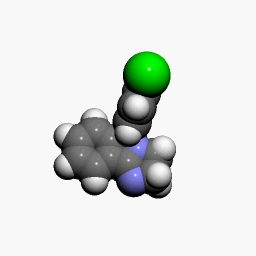Mazindol
Mazindol[edit | edit source]
Mazindol is a stimulant medication that is primarily used as an anorectic agent to aid in weight loss. It functions by suppressing appetite and is chemically related to the tricyclic antidepressants. Mazindol is not an amphetamine, but it has similar effects on the central nervous system.
Pharmacology[edit | edit source]
Mazindol acts as a monoamine reuptake inhibitor, primarily affecting the neurotransmitters norepinephrine and dopamine. By inhibiting the reuptake of these neurotransmitters, mazindol increases their levels in the synaptic cleft, leading to enhanced stimulation of the central nervous system. This action results in decreased appetite and increased energy expenditure, which are beneficial for weight loss.
Medical Uses[edit | edit source]
Mazindol is prescribed for the short-term management of obesity in conjunction with a calorie-restricted diet and exercise. It is typically used in patients who have not responded adequately to other weight loss interventions. The medication is usually prescribed for a few weeks, as its effectiveness tends to decrease with prolonged use.
Side Effects[edit | edit source]
Common side effects of mazindol include dry mouth, insomnia, nervousness, and constipation. More serious side effects can include hypertension, tachycardia, and palpitations. Due to its stimulant properties, mazindol has the potential for abuse and dependence, although this risk is lower compared to amphetamines.
Chemistry[edit | edit source]
Mazindol is a tetracyclic compound with a unique chemical structure that distinguishes it from other anorectic agents. Its chemical formula is C16H13ClN2O, and it has a molecular weight of 284.74 g/mol.
History[edit | edit source]
Mazindol was first introduced in the 1970s as an appetite suppressant. It was marketed under various brand names, including Sanorex and Mazanor. Over time, its use has declined due to the development of newer weight loss medications and concerns about its side effects and potential for abuse.
Regulation[edit | edit source]
In many countries, mazindol is classified as a controlled substance due to its potential for abuse. Its availability is restricted, and it is typically prescribed only when other weight loss strategies have failed.
Research[edit | edit source]
Recent studies have explored the potential use of mazindol in treating narcolepsy and attention deficit hyperactivity disorder (ADHD), given its effects on dopamine and norepinephrine. However, more research is needed to establish its efficacy and safety for these indications.
Related Pages[edit | edit source]
Search WikiMD
Ad.Tired of being Overweight? Try W8MD's physician weight loss program.
Semaglutide (Ozempic / Wegovy and Tirzepatide (Mounjaro / Zepbound) available.
Advertise on WikiMD
|
WikiMD's Wellness Encyclopedia |
| Let Food Be Thy Medicine Medicine Thy Food - Hippocrates |
Translate this page: - East Asian
中文,
日本,
한국어,
South Asian
हिन्दी,
தமிழ்,
తెలుగు,
Urdu,
ಕನ್ನಡ,
Southeast Asian
Indonesian,
Vietnamese,
Thai,
မြန်မာဘာသာ,
বাংলা
European
español,
Deutsch,
français,
Greek,
português do Brasil,
polski,
română,
русский,
Nederlands,
norsk,
svenska,
suomi,
Italian
Middle Eastern & African
عربى,
Turkish,
Persian,
Hebrew,
Afrikaans,
isiZulu,
Kiswahili,
Other
Bulgarian,
Hungarian,
Czech,
Swedish,
മലയാളം,
मराठी,
ਪੰਜਾਬੀ,
ગુજરાતી,
Portuguese,
Ukrainian
Medical Disclaimer: WikiMD is not a substitute for professional medical advice. The information on WikiMD is provided as an information resource only, may be incorrect, outdated or misleading, and is not to be used or relied on for any diagnostic or treatment purposes. Please consult your health care provider before making any healthcare decisions or for guidance about a specific medical condition. WikiMD expressly disclaims responsibility, and shall have no liability, for any damages, loss, injury, or liability whatsoever suffered as a result of your reliance on the information contained in this site. By visiting this site you agree to the foregoing terms and conditions, which may from time to time be changed or supplemented by WikiMD. If you do not agree to the foregoing terms and conditions, you should not enter or use this site. See full disclaimer.
Credits:Most images are courtesy of Wikimedia commons, and templates, categories Wikipedia, licensed under CC BY SA or similar.
Contributors: Prab R. Tumpati, MD




